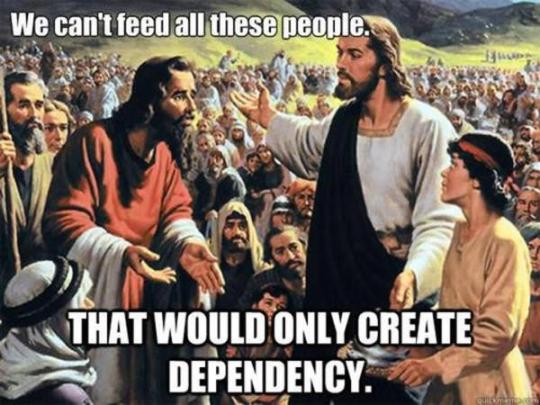A common criticism of Republicans is that Democratic government programs create more dependence and less independence. Republicans value independence, therefore they oppose such programs because they believe government programs disincentivize people. This is a plausible argument, on the surface at least. But not only is this an extremely cynical reading of human nature, it completely fails to engage with the reasons why Democrats institute such programs.

Democratic programs are designed for precisely the opposite reason. Not to create disincentivized, dependent people, but to increase citizens’ independence and freedom. Think about what public education and public healthcare achieve. It should be uncontroversial to note that the healthier and better educated a population is, the better able they are to contribute to the economy and society.
When people are skilled, well trained, and able bodied, they are not only maximally productive for their employers, they’re better able to start their own businesses. Investing in national education costs pennies on the dollar relative to the greater contribution educated citizens make to the economy and society as adults through taxes and civic engagement. The same with the preventative healthcare that Democrat’s proposal of universal health insurance enables: a penny of prevention is worth a pound of cure. (That’s part of the reason why the universal healthcare systems of the rest of the developed world are much cheaper and more effective than the US semi-privatized system.)

Democratic programs such as food stamps and Medicaid are specifically designed to help the poor to be able-bodied enough to be able to work enough to be independent. No one can achieve their ultimate peak of productivity if they’re sick or hungry. This is, or should be, obvious common sense.
It is a conservative myth that vast swathes of the population would prefer to be dependent on government. Humans almost universally prefer the dignity of work. A statistically insignificant portion of the human population prefers dependence over autonomy. There will always be a small percentage of the population who are grifters. But letting worries about a small minority of grifters prevent us from designing laws that benefit the vast majority who do contribute is cutting off our nose to spite our face. It’s the definition of false economy.

Democratic programs such as Social Security are designed to keep the elderly from destitution, it is true—and millions of these people are dependent on the government. But remember, the government is the public. Elderly people are also part of the public, which makes them part of all our extended family. Is society better off if someone’s own family can’t or won’t look after them, that nobody does? Would you be more ‘independent’ if your family couldn’t or wouldn’t look after you in your old age?
What about the disabled—does denying aid to people who are unable to work through no fault of their own make them more independent? That seems somewhat counter to Christ’s teachings, which conservatives often claim are the source of their morality.

Government is the organizational part of our public. I’m interested as to why smaller government is inherently better than larger government. To my eyes smaller government works best for smaller, less dense populations. Places where there is sufficient room for everyone to do their own thing without getting in anyone else’s way. For instance, if you’re living in Wyoming with six people per square mile, everyone can have a gun and fire off to their heart’s content without any of their immediate neighbors likely even knowing you have a gun. No one needs to regulate that. The same action in Manhattan however, where there’s 66,940 people per square mile, will have considerably different consequences for said person’s immediate neighbors.

In larger, denser populations such as cities, people willingly accept more rules that slightly curtail freedoms. This is to ensure everyone has maximum freedom—without impinging on other’s freedom.
Because you encounter so many more people on any given day in a city, you don’t have the same social dynamics of close-knit communities in small populations. There the only people you come across are often the same people you see for your entire life. In cities, the de facto responsibilities and obligations that neighbors and kinfolk have in smaller communities are simply codified and transferred to a broader group: the public via the government. In denser populations, everyone has to cooperate more, and on a higher level, in order to function. Saying either arrangement is better or worse is missing the point. It is clearly what’s necessary for humans to survive in each situation.
In the America of today, less than 15% of the population lives in rural areas. So why are Republicans trying to force a deeply unpopular “small government” philosophy (except for the military of course, the largest socialist program the government pays for) on the other 85% of Americans who don’t live in areas where small government is more relevant?
